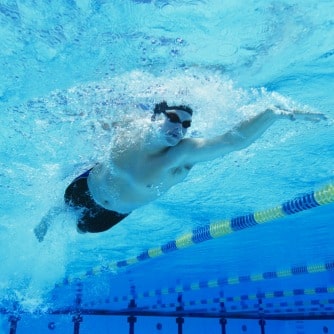The vast majority of swimming pools are chlorinated, in an effort to prevent pathogenic microorganisms from growing. Previous research has shown that many constituents of urine including urea, uric acid, and amino acids, interact with chlorine to produce potentially hazardous disinfection byproducts in swimming pools. However, Purdue University (Indiana) researchers warn that chemicals from pharmaceuticals and personal care products could also be interacting with chlorine, producing potentially harmful byproducts. Ernest R. Blatchley III and colleagues utilized liquid chromatography and tandem mass spectroscopy techniques to identify and quantify 32 specific pharmaceuticals and personal care products in water. Of the 32 chemicals investigated, the researchers detected three: N,N-diethyl-m-toluamide, known as DEET, the active ingredient in insect repellants; caffeine; and tri(2-chloroethyl)-phosphate (TCEP), a flame retardant. The team submits that the remaining 29 chemicals could have been present at concentrations below the detection level.




